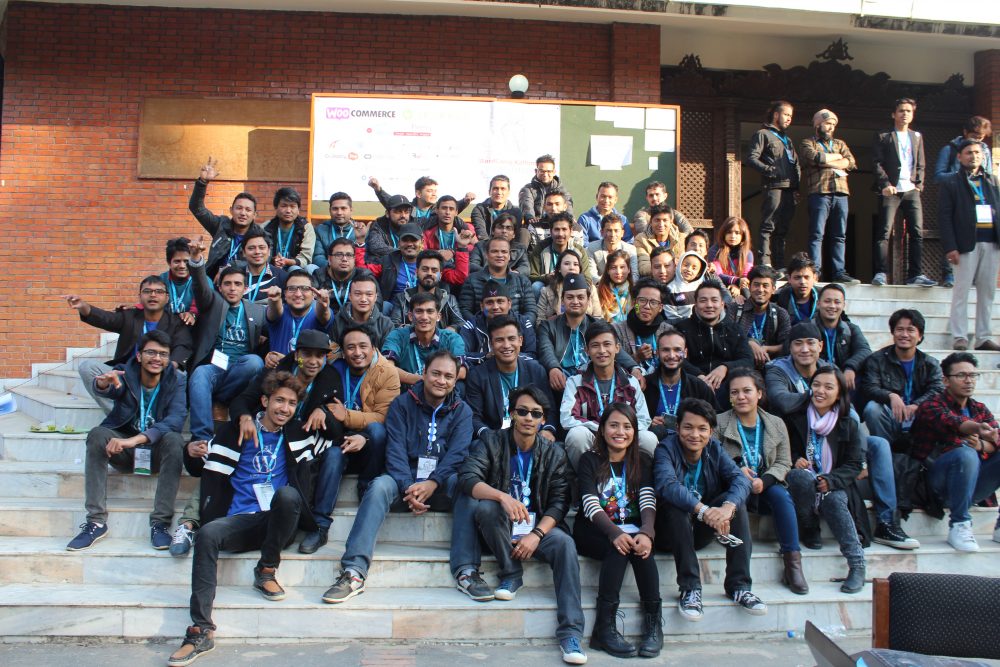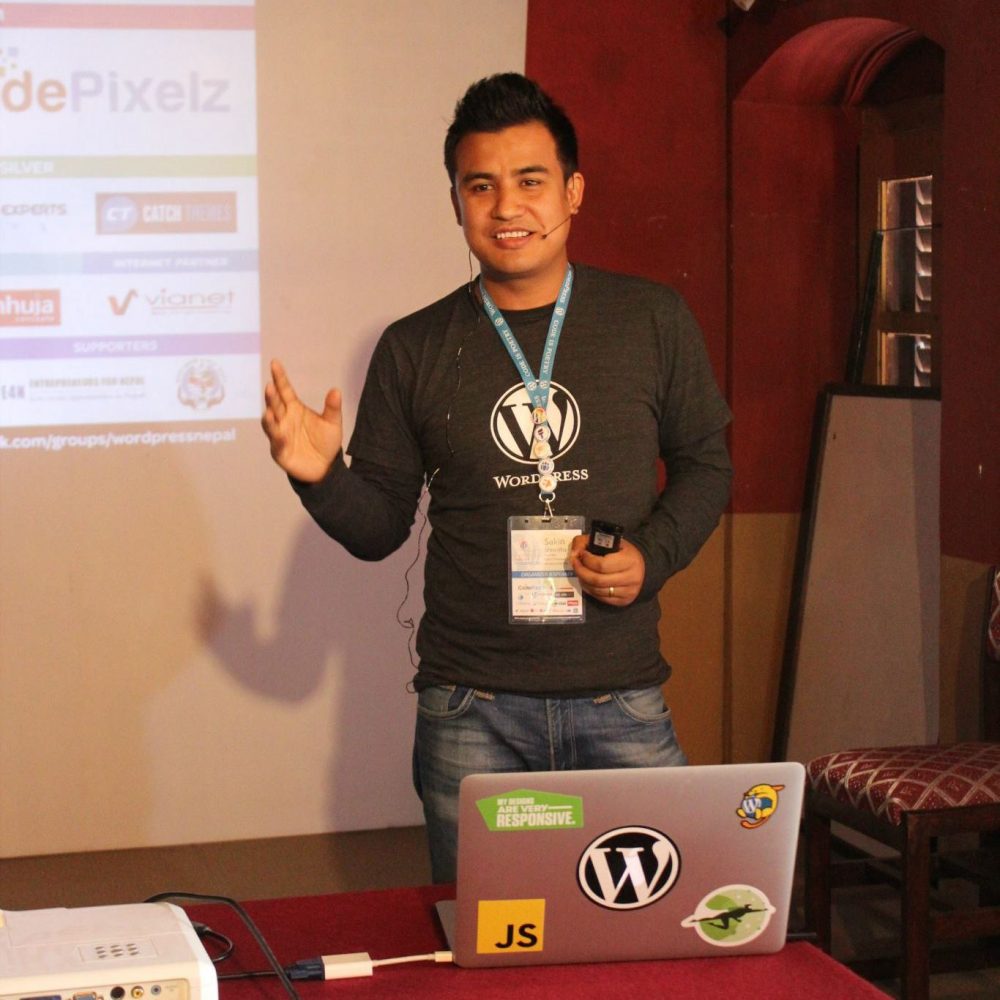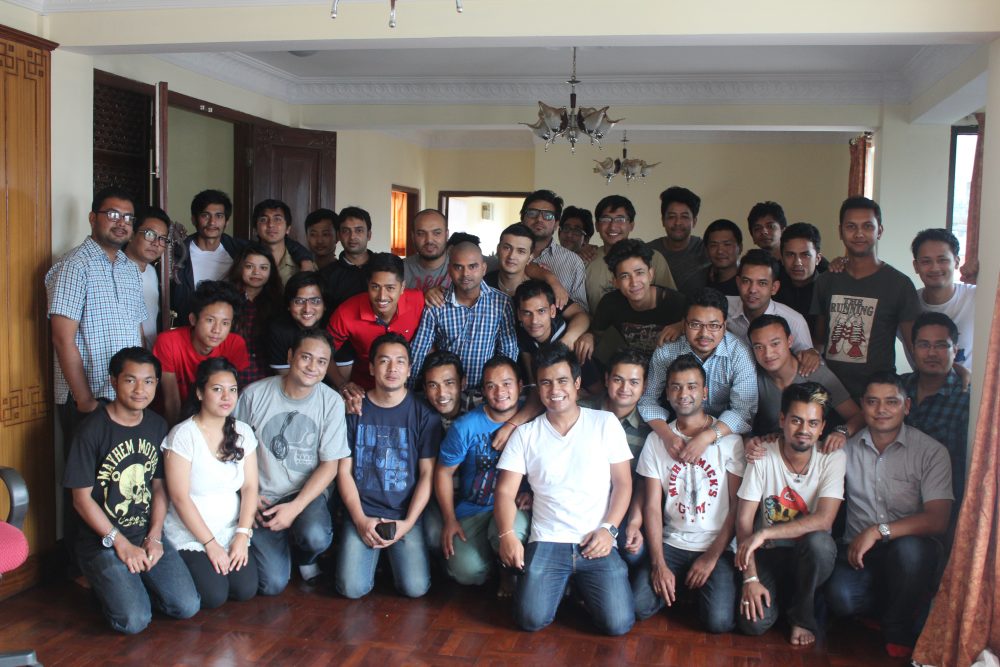As I edged my way into the crowded bar, I saw two people standing together, hunched over an iPhone, the intensity of their focus evident even in the dim lighting. They were oblivious to the rows of glittering bottles at the bar, the thudding of the (loud) music around them, the flashing lights playing over every surface. They were immune to all enticements to parrrrtayyy. Who were these people and what on earth could have captured their attention so completely?
It was nothing less than the challenge of solving a WooCommerce problem via mobile phone. Brent Shepherd, the founder of Prospress, was delivering in-person Subscriptions support at a WordCamp US afterparty. He was deep in conversation with Sakin Shrestha, the founder of Catch Themes, about a problem with Sakin’s store. After the issue was solved, there were lots of smiles and time for that well-deserved drink!
The next day, I met with Sakin in the foyer of the Philadelphia Convention Centre. He was happy to talk about his experiences as a WooCommerce entrepreneur, setting up Nepal’s largest theme company, becoming a major employer of tech talent in Nepal, being an avid supporter of the WordPress community, and his plans for the future.
Ali: Can you tell me a little bit about Catch Themes? How did you start it and what does it do?
Sakin: Actually, Catch Themes is a part of Catch Internet company. I was doing enterprise businesses with Catch Internet but I was so tired of [waking up] at night because most of my clients were US based.
Then, I had no life. [But I just] submitted some themes [to .org as a] hobby – I edited the default in 2011 and then converted it into Catch Box for my own site. [I submitted it to] .org as a trial. Then I had another theme I just built from a scratch – Simple Catch. I thought let’s submit it to .org [as well]. At that time I had no intention to create [a] theme shop.
[Then it was] so popular that I had to build [the] website catchthemes.com, because of the ongoing demand [and downloads]. At the time both the themes were in the top 10 most popular themes.
Ali: Oh wow.
Sakin: People were [saying], where’s the donation button? How can I help you? I want this feature. I want that. I was like, wow. So many interactions going on. I [felt much happier] than when doing client work.
It gave me so much satisfaction that I said, This is the thing I want to do. [So that’s how] I established Catch Themes. The users required me to! Actually they made me [go] into business.

Ali: Okay. So the themes took you into business. It’s great that you knew the demand was there right from the beginning. So you started back in 2011, what sort of growth have you seen since then?
Sakin: It’s been smooth. It’s not high. We’ve grown slowly from our initial sales level, we are now doing about twice that amount. I think it’s good growth in terms of staying in Nepal. It may not be good in terms of staying in US but [when] compared to the low cost of living, I think that’s good growth. Also, we have stable growth so I don’t worry that much. Many theme companies [have high] growth then [they] go down. Mine is always kind of growing more and more. It’s a slow [growth rate] but it’s a stable one.
Ali: That’s good, it’s nice to have a good, sustainable growth curve. And how many people are on your team now? I think you mentioned you have about 70?
Sakin: Yeah, that’s the team that I founded at the beginning of 2015. I’m moving [my] different companies under the name of Acclaim Technology. We have 70 people on that.
Ali: How long did it take you to grow to a team of 70 people?
Sakin: From 2011 actually.
Ali: Wow, so how do you manage your human resources and team culture and hiring when scaling to 70 people within 5 years?
Sakin: It scaled slowly. [It didn’t go] directly to 70. It was like 10, 20, 30, 50, 50 and with different companies coming together. We [grew] slowly. [My partner and I] decided to mostly hire from WordCamps: WordCamps in Kathmandu, WordCamps in Nepal, and through references. We also posted in our local job portal.
If [we are hiring] from references, we don’t have such a strict process. They can just join, because we know [them] already. Nepal is a very small community so we can actually talk to them, [and if the hire comes] from references from your present employees then they don’t have to follow the strict guideline of getting in. They can just get in.
If they’re applying from the job portal then they have procedures like interviews, tests and all those things.
Ali: Excellent. That’s awesome. What kind of culture would do you say your team has?
Sakin: It’s a very flat culture. [There are] no higher positions and lower positions. I actually sit [together] with my developers. I don’t have a personal room. I love staying with them because I can interact with them directly. We go to movies. We go [on] outings. We have [outings] at least four times a year. We go to different places and stay there, usually one or two nights.
That’s the cool thing. We work like a family. There are even some family members joining me as a developer: they started [coding] and came to my team.
Ali: Do you have any employees working remotely, or are you all in the same building?
Sakin: [Having a ] virtual office is not that possible in Nepal because of the culture. We have three levels of family living in the same house: the grandparents, the children and [so] everyone would disturb you if you work from home. I used to work from home but I have a child now, he doesn’t allow me to work from home.
Ali: He wants you to play with him, but not work.
Sakin: If I am on the computer he will say, I will work for you. I think Okay…
Ali: Yeah, This will be interesting.
Sakin: He wants to work for me, yeah.

Ali: Speaking of getting your developers started, are you involved in helping people do courses or can they do courses at the university? How do people get the education to become developers?
Sakin: Actually most of the staff [have] already done some kind of courses in IT. We have a training team [that] will train them in WordPress. Many of them will not directly [know] WordPress but they are good with programming. We teach them how to code and how to code properly using the WordPress functions. We also have training and mentoring sessions.
Ali: Oh, excellent. How did you set that up?
Sakin: We usually have Friday kind of [as a day off]. Not off exactly, [but] you don’t have [the] pressure of working that much. You can do a workshop. You can do movies if you want. You work in the morning but after lunch you can do whatever you like to do. [Some people] gather round [and do] on the job training.
Ali: Okay, that sounds great. So I was going to ask you how you find your customers but it sounds like your customers find you.
Sakin: Yeah, it’s just [the] opposite.
Ali: So how did you decide on WooCommerce to run your marketplace?
Sakin: I want to do everything in WordPress. I had been following WooThemes for a long time. Then I was searching [for] good options and saw WooCommerce being so popular…
I saw that, Okay, I can use WooCommerce. I trusted them because of their contribution. They had been developing for a long time. I didn’t know that they would be bought by Automattic.
Ali: Yeah, nobody did. So you’re happy with WordPress, and with WooCommerce… how would you say that having a subscription option has affected your business?
Sakin: It’s really good because I know how many people have to renew and all those things. I can see in my theme shop there[ are] about 11,000 users, but sales [are] more than that. [With a] theme shop there’s a lot of recurring payments and subscriptions helps a lot in that.
Ali: That’s great to hear. So now I’d like to ask what are you most proud of about your business? Is there a moment where you looked back at what you are achieving and were really proud?
Sakin: [The] main thing I’m proud of is the community. The WordPress Nepal community, not just my business. [The] second thing I’m proud of is [that] I decided to stay in Nepal. That is [my] proudest [achievement] because I am able to employ so many people back home. If I [had moved to] the [United] States I might not be able to employ so many people. I’m giving a lot of opportunities to the people back home.
Ali: Yeah, definitely.
Sakin: That’s the proudest moment. After that [would be] getting known [in] the WordPress community because of the themes. That’s the proudest moment I think.

Ali: Excellent. Do you have a favourite theme or a favourite project?
Sakin: Yeah, recently my favourite theme is Rock Star theme. I had my cousin design it. He’s actually a stencil designer. He didn’t know that much about computer designing. He wanted to do something and stencil design is not popular in Nepal. I said, why don’t you join my company. I will teach you the illustration design and all those things. This is [his design, and] I’m so proud of him that he changed from the stencil design to computer and he’s making a good living now. Also, this design is very popular now in WordPress.org.
Ali: That’s so great, and such an awesome opportunity for your cousin. So what do you wish somebody told you before you started your business? What do you wish you knew before you started?
Sakin: If they told me you can do so much with WordPress then I would [have done it a] lot faster. If they [had told] me you [can make a] business in themes and plug-ins, then I would have started a lot earlier. I was [originally] lost in doing normal outsourcing, by working at home only. I used to work by myself.
If I [had known] that I can grow this big a community then I would have started a lot earlier and [done a] lot more.
Ali: That’s perfect. Do you have any further advice for entrepreneurs who are just starting out? Who are just starting the beginning of their journey? People who want to start a business?
Sakin: Yeah, the best advice I would like to tell them is, don’t worry about the future. Just start it. Just start small, but build it. Just start small. Starting big in Nepal is very difficult. Just start small. Whatever you know, just start it. If you don’t know much about it, then consult with the people who are [already] doing it. Everybody is very friendly.
In our culture we feel like we [can’t] approach people. I also didn’t approach anyone but that’s why I learn[ed] so many things after experimenting. If you approach the people who know it already, then your business start-up [will] actually move faster than expected.
Just do it and just take advice.
Ali: Excellent. Keeping that in mind, what’s the biggest challenge you faced in building and growing your business?
Sakin: [The] biggest challenge is [recruiting and] man power. We have a shortage of human resources because we have a lot of brain drain. We are a country where [the] majority send remittances by working abroad. That’s the biggest challenge of [growing] my company in Nepal, I think. That’s why we need to train more and more, and [encourage] people to stay at home.
[Offer]them good earnings. That’s the only way we can make them stay because they are so motivated by the fascinating buildings and the cars in the States and Australia. The earnings are [better] than back home.
I want to change that if possible. We have been successful at certain level but that’s where the challenge is for our company: when I try to hire good people I cannot find them. I always have to train people.
Sometimes I urgently need help [with] senior positions but other times I’m like, there’s no option of hiring senior positions directly.
Ali: Do you have a programme to take people from high school then maybe train them?
Sakin: Yeah, we are doing that. We are taking on a lot of internships. I think many of our … 70% of our staff has come from the colleges directly. They apply when they are in college. If they don’t get a job they just go away.
Ali: They go overseas.
Sakin: We cannot catch them. It’s already too late. They are already in the aeroplane.

Ali: That’s really smart. And so good for your community – keeping the smart, educated people in Nepal by offering them real career options as soon as possible. So was there anything you’d like to say that I didn’t ask you about?
Sakin: Mostly, I want to add how we [we are thinking about how we] can influence more females in Nepal to come to the WordPress community … We [have] already started but we are planning [to have] a lot of work stuff for female candidates. Also we’ll try to [encourage] females in IT companies to speak. So that they can actually [influence] other females. Just like I influenced male people but then I might have not influenced lot of female people.
So I want females to talk. That’s on my wish list as well. I want more females talking at WordCamp Nepal, at WordCamp Kathmandu, and other WordCamps too. Especially in Nepal I want more females to talk, more females to develop.
My favourite part of WordCamp US [was that] I got [the] opportunity to talk about the WordPress Nepal community. I gave a talk on breaking social barriers and creating opportunities. That’s the best thing, I think. I get to showcase my Nepal to all over the world.
Conclusion
Sakin might have accidentally stumbled onto a popular niche for his theme company, but he has worked hard with positive intention and determination to use that success. He’s built his company and invested heavily in the WordPress Nepal community, using his success to help other people from his country to find fulfilling and rewarding careers in their home.
Through the power of WooCommerce and Subscriptions he sustains a team of 70 developers, designers, and doers, treating everyone like a big happy family.
I was so inspired by his dedication to training the younger generation, his commitment to his local community (both through his business and through WordPress Nepal), and especially by his energy and ambition around opening up opportunities for female developers and women in technology. As we shook hands and said goodbye in Philadelphia, I felt sure we’d hear more about this remarkable man in future.

